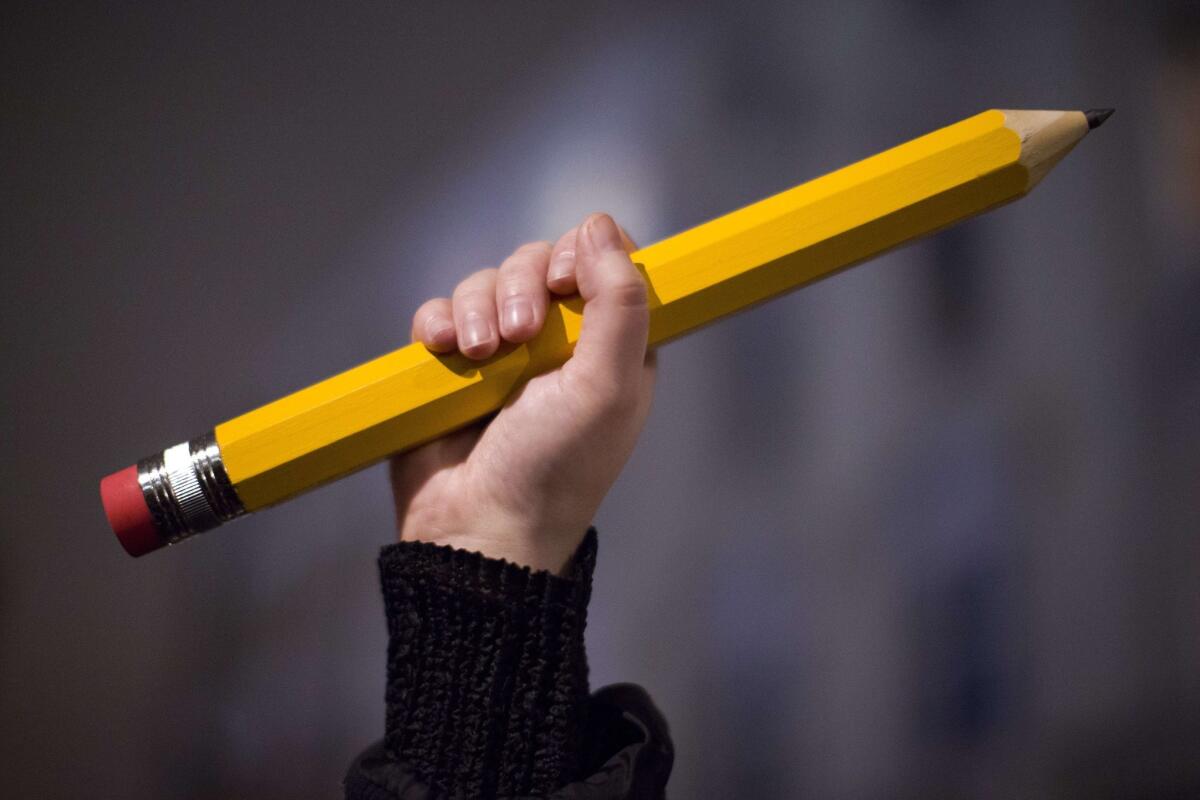Bravery, self-exposure and the precision of words

- Share via
Last week, under the influence (perhaps) of George Orwell, I posted on Facebook my desire to strike the word “brave” from the lexicon. The post was partly tongue in cheek and partly not; I admire bravery, but also think the word is widely overused. We now routinely refer to any provocative piece of memoir or personal writing as brave, as if a writer were facing down some sort of fusillade every time he or she sat down to work.
In that sense, I am in the camp of Bob Dylan, who (according to one commenter in my Facebook thread) responded to a recent interview question about risk with this stunning bit of clarity: “Risky? Like walking across a field laced with land mines? Or working in a poison gas factory? There’s nothing risky about making records.”
I feel the same way about writing, sort of; although I acknowledge it can be scary to set down what you think and feel, I’m not sure “brave” is the operative description. All ideologies aside, brave is putting a cartoon of the prophet on the cover of your publication less than a week after your editorial staff was executed for doing precisely the same thing.
But more to the point is the question of bravery as a virtue in its own right, since, as another commenter noted, this overlooks the fact that one can be “brave AND stupid, brave AND dishonest, etc etc.” That’s an important distinction, and it suggests the real issue, which is the devaluation of both word and idea. What does bravery mean, in other words, if we call everything brave? The same as “fierce” or “radical” — which is to say nothing at all.
Here’s where Orwell comes in, since he stood for the precision of language, as both an aesthetic and a political act. Words have meaning, and when we misuse or overuse them, we cannot help but strip that meaning away.
I think about this often, since I work with words not only to make my living but also to understand my life. Language is an imperfect tool but it is the only one we have, and when we use it sloppily, we undermine its power. “Friend” and “like” are the most obvious examples of this — two words that have been so misused, so often, that they have ceased to mean much of anything at all. Also: “bold,” “awesome,” “moving,” “powerful.”
It’s telling, I think, that many of these are emotion words, which aspire to evoke, or describe, how we feel. This is one of the key conundrums of language, which is an intellectual structure rather than an intuitive one. The first challenge of the writer is to channel a feeling, a sensation, into the starkness of a sentence that can at best only approximate the experience it seeks to describe. This is also the wonder, the art of it, when it is working — which is to say, when the language is at its febrile best.
That’s why writing and reading is a collaboration, because what a writer is really doing is to create a frame a reader can not only enter but also animate, a frame we can feel. The most astonishing sentences are those that stir emotions: Joan Didion’s “We tell ourselves stories in order to live”; William Faulkner’s “My mother is a fish.” Both mean one thing on the surface, and another when we climb inside them, allow them to illuminate our own confusion and awe (in the old-fashioned, double-edged sense) at the elusive tangle of the world.
Language, then, is not so much a means of explication as it is of wonder, a mechanism for evoking the mysteries at the center of every life.
This is my problem with “brave” and other words like it: They do not engage but rather insist. They are singular, anti-conversational, self-congratulatory even; they pre-digest our experience, before we get a chance to have it for ourselves.
I do not mean to suggest that there are no stakes in writing, that some stories are not difficult, or even dangerous, to tell. Nor am I saying that staking out certain territories — personal, political, cultural, sexual — is not transgressive and essential in a culture that likes its stories ready-made.
Transgression, however, is most effective when it comes as part of a back-and-forth, when it provokes our empathy. Ready-made words and phrases (to steal another concept from Orwell) do the opposite, keeping us at a distance rather than drawing us closer in.
In the end, it’s a question of complicity, which is, of course, the very essence of art. Writing may set the context, but we are complicit in how we read it, how we process it. What makes good narrative is what reveals us, yes, but that revelation has to open out.
When I teach, I often refer to this as “the squirm factor” — as in, material that makes both writer and reader squirm. Sometimes the work that renders us the most uncomfortable is that which allows readers to connect: both because of how they see us, and also because of how it coaxes them to see themselves. This is the squishy middle ground of self-exposure, in which the more we share about the depths of our own circumstance, the more (paradoxically) we connect.
That’s not bravery but something more complex, like faith: a matter of nuance, sympathy, the blurring of the space between us, which we can bridge only (and only for a moment) through the fleeting consolations of narrative.
Twitter: @davidulin
More to Read
Sign up for our Book Club newsletter
Get the latest news, events and more from the Los Angeles Times Book Club, and help us get L.A. reading and talking.
You may occasionally receive promotional content from the Los Angeles Times.











